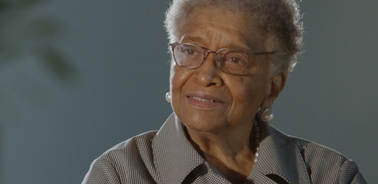- Home
- Blue Talks
- If Your Dreams Do Not Scare You: The Spectacular Life Of Ellen Johnson Sirleaf
If your dreams do not scare you: The spectacular life of Ellen Johnson Sirleaf

Her journey to becoming the first elected female head of state in Africa and a Nobel Peace Prize Laureate was anything but easy.
The story of Ellen Johnson Sirleaf reflects that of her nation Liberia in its intensity, contrasts and seemingly undefeatable hope. “The size of your dreams must always exceed your current capacity to achieve them,” she wrote in her 2013 memoir. “If your dreams do not scare you, they aren’t big enough.”
Born in 1938 in Liberia, Sirleaf’s early life was marked by the loss of her father at age seven and the strength of her mother who took care of the family through hard work and sacrifice.
At 17, Sirleaf got married the same year she graduated from high school. Over the next decade, she dedicated her time to her family, which grew as she had four sons in rapid succession. When her husband had the opportunity to study in the United States, she seized the moment and joined him to earn an accounting degree from the Madison Business College in Wisconsin.
They later returned to Liberia, where Sirleaf landed a position in the nation’s Treasury Ministry. But the pressure of two careers led to stress in their marriage. Sirleaf suffered domestic abuse, which led her to file for divorce. Around the same time, Liberian leaders threatened her with a jail term for calling for the country to return to democracy, a pattern that would mark her life.
In what she described as an “escape,” she returned to the United States to continue her education. During the height of protests against the Vietnam war, she studied and completed a master’s degree in public administration at Harvard in 1971. Once again, she returned to Liberia and rapidly ascended in the government. Still, she refused to keep silent about the corruption plaguing her country.
A tumultuous political career
Despite her frankness, she became Minister of Finance in 1979 — a position she would hold only until a coup d'état shook the country in 1980. The president she was serving under and most of his cabinet ministers were executed by firing squad. Sirleaf and just three other ministers were spared. That year, she fled Liberia again.
Her journey took her to Washington, DC, where she worked for the World Bank, then to Kenya to serve as Vice President of the African Regional Office of Citibank. Still, she felt compelled to serve her country. In 1985, she returned to Liberia to relaunch her political career.
While running to be vice president, she gave a speech criticizing the corrupt regime. As a consequence, she was sentenced to ten years in prison for sedition. Soon after, she was pardoned due to international pressure. After the elections and another coup attempt, she was thrown back behind bars. In 1986, she was released and fled yet again to the United States, taking a job with HSBC Equator Bank. Eventually, she moved on to a role with the United Nations, though she never took her eyes off the developments in her homeland.
In 1989, the first Liberian civil war broke out. It would rage until a cessation of hostilities in 1996. In 1997, Sirleaf returned to her nation to run for president but was defeated by President Charles Taylor. As one of his most outspoken critics, Taylor threatened to have Sirleaf killed, so she left Liberia once again.
Liberian women rise up
Shortly after, Taylor plunged Liberia into war with its neighbors and a second civil war. Eventually, Liberian women, who were facing unbearable cruelty, insecurity and displacement, rose up in protest. The Women of Liberia Mass Action for Peace movement eventually convinced Taylor’s regime to enter into dialogue with rebel groups. After playing a pivotal role in establishing peace, the same movement said that peace was not enough. Its members wanted to make sure women voted for politicians who would help the country prosper, so they galvanized the electorate in the run-up to the 2005 election.
That’s when Sirleaf was elected as Africa’s first female head of state. It was a turning point for the nation. In 2011, Sirleaf and two other female African activists were awarded the Nobel Peace Prize for their role in securing women’s safety and bringing them into peace-building work.
While Liberia still has its struggles, peace has reigned since she took office. During her time as President of Liberia, Sirleaf established the right to free, universal primary education. She also enforced equal rights for women, made strong advances in rebuilding the war-torn nation and successfully won the battle against a deadly Ebola outbreak.
After her term limit expired, she left Liberian politics, though her powerful work for progress has not ceased. In 2018, she founded the Ellen Johnson Sirleaf Presidential Center for Women and Development, which aims to "unleash Africa’s most abundant untapped power — its women".
Since 2019, she has also been working with the World Health Organization and now serves as co-chair for its pandemic response panel.
“When resilience is expressed by leaders, when its demonstrated from example, it tends to become a convincing element for societies,” she said from deep experience during a recent interview with IE University President Santiago Íñiguez.
In 1980, Sirleaf was one of just four government ministers who was not executed.
Her organization aims to "unleash Africa’s most abundant untapped power — its women".